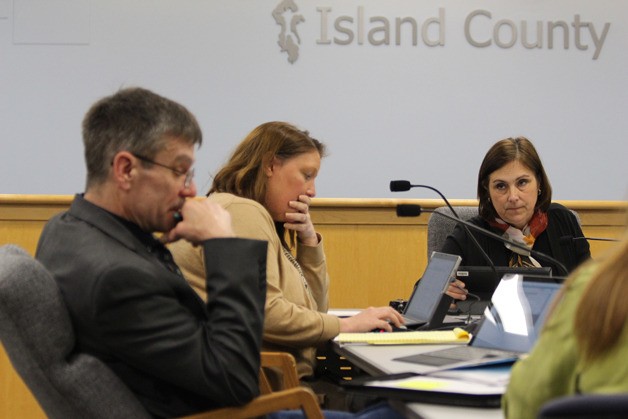The Island County commissioners don’t always agree on how to approach the comprehensive plan update due next year, but all believe it needs as much public participation as possible.
The board met with members of the Island County Planning Commission in an annual joint meeting Monday where they discussed, and occasionally argued, their priorities for the county’s land use future.
Counties are required to update the comprehensive plan, or comp plan, every eight years, ensuring that county regulations are in keeping with ever-changing state requirements and reflect local priorities. The updated version is due in June of 2016.
So far, planners have received around 600 surveys both online and in recent public meetings.
Commissioner Rick Hannold pointed out that the returned surveys are only a fraction of the county’s 4,900 registered voters.
“I think you would do far better to have a community discussion to explain the comp plan and ask for verbal input,” Hannold said.
Commissioner Jill Johnson said the county was “doing well” to offer multiple ways for people to be involved, providing online and in-person platforms for input.
“People have different preferences,” Johnson said.
Commissioner Helen Price Johnson said she is hearing input personally that doesn’t seem to be getting back to planners, which is a frustration to her district.
“They’re finding me, but I don’t think they are finding you in the same way,” Price Johnson said.
Commissioners also agreed that the county’s ordinances need to be more accessible and easily interpreted by the public.
“Our code is not user-friendly in its current form,” said Price Johnson, who added that she’d like to get rid of all the code’s “glaring contradictions.”
“We need to identify areas where we have different priorities,” Johnson agreed.
County staff has estimated that they will require approximately 7,480 hours to accomplish the minimum required updates and “code cleanup” to the county’s ordinances.
Commissioners voiced concern that the breadth of work already before them would limit the county’s ability to have larger conversations on specific issues and more public participation.
“What’s our capacity to take on other scopes of work?” Johnson asked.
Long range Planner Brad Johnson said planning staff does have some capacity for new discussions but they “need to be careful of taking on more than we can or missing our deadline.”
“We need to make sure it doesn’t get out of control,” he said.
Discussions not specifically outlined in the comp plan update, but listed by Price Johnson as priorities, are the discussion of Freeland as an urban growth area, rural event center regulations and the boundaries of communities like Clinton.
Looking at the county code as a whole, Hannold said he’d like to “get rid of variances” whenever possible to avoid ambiguity.
“My angle would be, I would like it to be cleaned up to the point of reducing the number of appeals [that have] to do with language,” Hannold said,
However, the community needs to be clear what they want from their government because “absolutes come at the tradeoff of flexibility,” Commissioner Johnson said.
Johnson said she’d support removing the Board of County Commissioners as an appeals body in some cases because planning is not their expertise. These appeals should instead go straight to a superior court, said Johnson, because the board’s lack of land use knowledge may also be opening them up for lawsuits.
Johnson said this is “an old way of going about it… a good-old-boy way” that she’d replace with a “de-politicized” and regulation-based appeal system when it comes to the comp plan and the corresponding county ordinances.
“I’d get that moving,” Johnson said.
Hearing Examiner Michael Bobbink agreed that, “if you give them messes in the code, it just gives them all the more argument.”
Bobbink offered to use part of his retainer as hearing examiner to help perform “code scrub” as part of shouldering the manpower needed to complete the update.



